NHS has MORE staff and money than ever... but is less efficient: Damning audit by public spending watchdog
- Patient satisfaction and access to urgent treatment is 'worsening', report said
The NHS has more staff and money than ever before but is less efficient, a damning report by the public spending watchdog reveals today.
An investigation by the National Audit Office found patient satisfaction and access to urgent treatment is 'worsening', with long delays for ambulances and A&E.
It warns improving services will be a 'significant challenge', largely because delays discharging medically fit patients mean bed occupancy is too high.
This has a damaging knock-on effect, with patients left languishing on trolleys in emergency departments as they wait for a bed on a ward and ambulances forced to queue to drop off patients, leaving them unable to respond to new 999 calls.
The NAO report, titled 'Access to unplanned or urgent care', provides Parliament with an overview of NHS services available when people need rapid access to 'urgent, emergency, or other non-routine health services'.
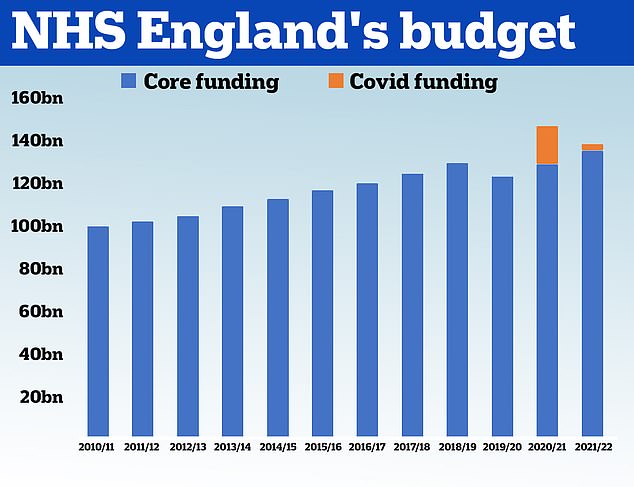
HM Treasury data shows the NHS received £100.4billion in 2010/11 and its budget had grown steadily until 2019. In 2020, the NHS was given £129.7billion of core funding for its usual services, which was topped up with an extra £18billion to help with the pressures from the pandemic. For 2021/22 the Treasury said the health service is set to receive £136.1billion pounds of core funding, as well as £3billion to help with the Covid recovery
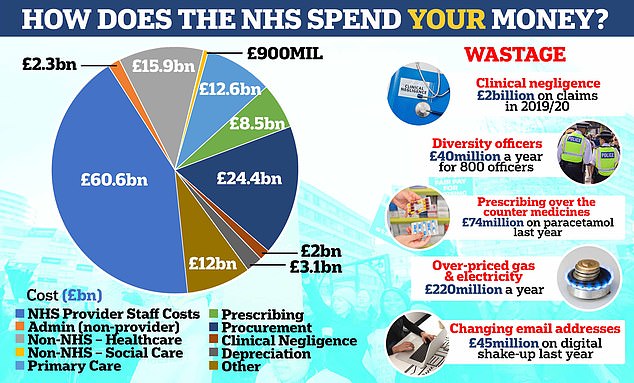
The NHS spends around £150billion-a-year, of which just under 43 per cent is spent on staff wages. Graphic shows: A pie chart of Department of Health and Social Care revenue spending on the NHS (left) in 2019/20 and areas where expenditure is seen to have been wasted (right)
It says there were 25.2 million A&E attendances in 2022/23, which is up from 21.6 million in 2011/12.
However, it notes the number of full-time equivalent NHS staff has increased, including those working in planned or urgent care, by 32.4 per cent from the most recent low of 963,471 in June 2013 to an all-time high of 1,275,354 in February 2023.
NHS funding is also up, with a total budget of £152.6 billion in 2022/23, some £28.4 billion more than in 2016/17 at 2022/23 prices.
The report adds: 'The NHS has not been able to secure the full benefits of increased spending and staff numbers, and productivity has fallen since the onset of the Covid-19 pandemic.
'The NHS has not met key operational standards for unplanned or urgent care since before the pandemic.'
The health service has had to cope with record hospital bed occupancy, with 92.3 per cent filled between January and March.
Across all A&E departments, the last time the NHS met its target for 95 per cent of patients to be admitted, transferred, or discharged within four hours of their arrival was in July 2015.
The NHS has not met its target to complete all ambulance handovers at hospitals within 30 minutes since it started collecting data in November 2017.
Meanwhile, ambulance response times for Category 2, 3 and 4 incidents rose after February 2021, and reached record highs in December 2022, before falling in the first months of 2023.
Gareth Davies, head of the NAO, said: 'More people than ever before are receiving unplanned and urgent care, with NHS England spending increasing amounts of public money and employing record numbers of people.
'Yet patients' satisfaction and access to services have been worsening, suggesting there is no single, straightforward solution to improving a complex and interdependent system.
'While NHS England has a plan to improve services, long-term trends in workforce, activity, spending and performance indicate this will be a significant challenge.'
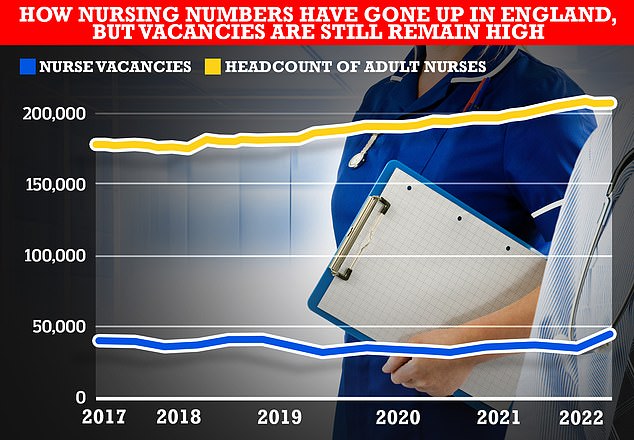
While the headcount of full-time-equivalent adult nurses, who account for most nurses in the NHS in England, has gone up the number of nursing vacancies has remained stubbornly high, official figures show. This has left the NHS treading water in terms of staffing shortages
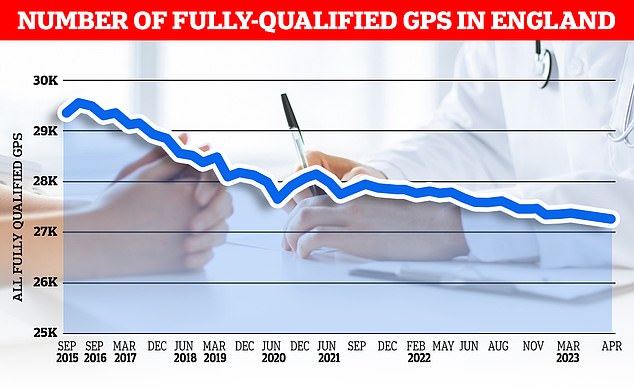
GPs say their surgeries are overwhelmed due to the pressures of the rising and ageing population, a lack of government funding and a shortage of doctors. NHS statistics show there were 27,231 full-time equivalent fully qualified GPs working in the NHS in England, as of April 2023. Full time equivalent terms equate to 37.5 hours a week
Meg Hillier MP, Chair of the Committee of Public Accounts, said: 'Increasing demand for healthcare is pressuring a strained health service.
'The NHS has more funding and staff than ever before, but patient access to urgent and emergency care – both in hospitals and in the community – is deteriorating across a suite of measures, with this decline long predating the Covid-19 pandemic.
'It's clear more of the same won't work.
'The Department of Health and Social Care and NHS England need to wake up to the severity of these long-term trends if they are going to give patients the service they deserve.'
The number of A&E patients waiting longer than four hours for admission to wards following a decision to admit reached an all-time high in December 2022 at 170,121, the report says.
More patients waiting longer in A&E departments has limited ambulance services' ability to transfer patients, with 74,473 ambulance handovers exceeding 30 mins in February 2023 compared with 47,480 in February 2018.
Average ambulance response times for Category 2 incidents exceeded 39 minutes in March 2023 compared with just under 28 minutes in March 2018.
Ambulance response times for the most urgent Category 1 incidents vary significantly, with an average time of 6 minutes 51 seconds for the London ambulance service in 2021/22, compared with 10 minutes 20 seconds for the South-West ambulance service.
And response times for answering 999 calls similarly vary, with an average time of 5.4 seconds for the West Midlands ambulance service in 2021-22, compared with 67.4 seconds for the South-West ambulance service.
Earlier this year NHS England published a two-year plan, with more than £2.5 billion of funding, which aims to improve patient experiences across urgent and emergency care services by increasing capacity; growing the workforce; improving discharge; joining up care outside of hospitals, and making it easier to access the right care first time.
An NHS England spokesperson said: 'As this report shows, NHS staff have experienced a significant growth in demand, with 3.6 million more people receiving care in A&E a year compared to a decade ago and almost 40 million more GP appointments a year than before the pandemic – all while doubling the number of cancer checks since 2013 and introducing innovative ways of working to bring down the longest waits for treatment that inevitably built up during the pandemic.
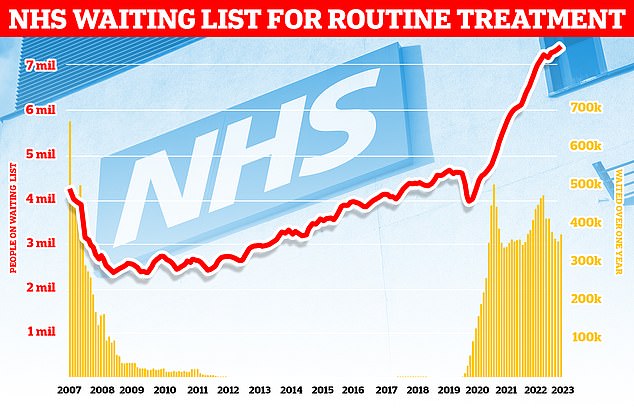
The number of people waiting for routine hospital treatment in England soared to a record 7.42million (red line) in April, figures show. More than 370,000 people in the queue for routine ops, such as hip replacements, were waiting for more than a year (yellow bars)
'While this huge increase in demand, combined with high bed occupancy, the impact of a 'twindemic' of Covid and flu over winter and industrial action have undoubtedly been challenging for the NHS, there have been significant improvements in performance since the start of this year and our recently launched recovery plans for urgent and emergency care and primary care set out the changes we are implementing to provide better and faster care for patients.'
A Department of Health and Social Care spokesperson said: 'We are working to achieve one of the fastest and longest sustained improvements in emergency waiting times in the NHS' history.
'The NHS' Urgent and Emergency Care Recovery Plan, includes getting 800 new ambulances on the road and increasing hospital capacity with an additional 5,000 more beds, as well as delivering an extra 3,000 virtual ward beds to safely care for people from home.
'The NAO acknowledges that there is no single solution to the complex challenges facing the NHS, but we are pleased it has recognised progress made in increasing staff working in urgent care, and providing tens of thousands more GP appointments.' DM.
This Blogger would like to see the NHS bottom funded. Monies should follow the patient.

.jpeg)